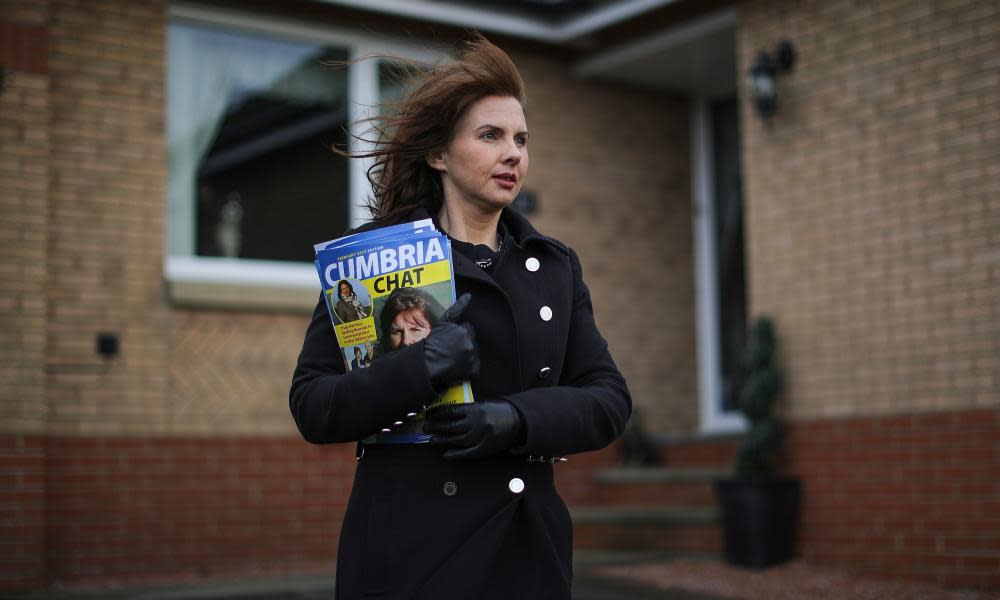Tories overturn Labour majority to win Copeland byelection

Jeremy Corbyn is under further pressure after a humiliating byelection defeat at the hands of the Conservative party in Copeland, a heartland seat dominated by Labour since 1924.
Gillian Troughton, the Labour candidate, was defeated by the Conservatives’ Trudy Harrison, marking the first time a governing party has taken a seat from another party in a byelection in 35 years.
The Conservatives took 13,748 votes to Labour’s 11,601 after a turnout of 51%. The Lib Dem candidate, Rebecca Hanson, came third with 2,252 votes.
Troughton left the count at Cleveland Sports Centre within minutes of the dramatic result being announced and without making a concession speech. She was heckled by a passerby who shouted “Sack Corbyn!” as she was rushed into a waiting car.
Harrison, a political novice, said in her victory speech: “What has happened here tonight is a truly historic event. You’d have to go back more than a century to find an example of a governing party taking a seat from the opposition party in an election like this.
“We’ve had Labour here for more than 80 years but it’s been very clear talking to people throughout this campaign that Jeremy Corbyn doesn’t represent them.
“They want a party which is on the side of ordinary working people, which will respect the way we voted in the referendum, and which will build a country which represents everyone. That’s why they voted for me tonight.”
default
Labour was battling to save a slim 2,564 majority left by Jamie Reed, an outspoken Corbyn critic who quit to take a job at the local Sellafield nuclear decommissioning plant.
Critics of the Labour leader will claim that his perceived hostility to nuclear was key to the defeat. The industry employs more than 10,000 people in the west Cumbrian constituency.
Tory campaigners made much of an ITV Borders television interview by Corbyn at the end of January in which he failed four times to say he supported Moorside, a multi-billion pound nuclear plant planned to be built next to Sellafield.
Labour’s campaign focused heavily on Tory-backed plans to close the maternity unit at the new West Cumberland hospital, meaning the nearest service will be an hour-long drive away in Carlisle.
Troughton, a borough councillor, retired doctor and St John ambulance driver who voted against Corbyn in the last leadership contest, consistently claimed the hospital was the “number one issue on the doorstep”.
Labour's Gillian Troughton leaves count without making concession speech. Heckled as she got in waiting car. #CopelandByElection pic.twitter.com/B6qFCbkHV1
— Josh Halliday (@JoshHalliday) February 24, 2017
Speaking after the result, Andrew Gwynne, the Labour MP for Denton and Reddish who ran Troughton’s campaign, conceded that the party “struggled to convince” voters that it backs nuclear power.
“This has been one of the most polarised campaigns that I’ve ever known, centred on two issues about the worries people have about the downgrade to West Cumberland hospital,” he said.
“With Gillian Troughton we had a superb candidate who put the NHS at the heart of the campaign and really did work hard on the ground to get the message out that we wanted to save those services.”
Gwynne declined to answer whether Corbyn was to blame and said the Tories “threw all kinds of stuff at us on the nuclear issue and that clearly resonated with some people”.
He added: “The other issue was nuclear and we struggled to convince people that the Labour party is and remains a pro-civil nuclear party committed to the Sellafield decommissioning site, but also committed very much to the new power plant at Moorside as well.”
Harrison, a former Sellafield worker, told voters she was best placed to lobby ministers on the hospital and already had commitments for a government inquiry.
She said road upgrades, a constant complaint by Copeland voters, would be announced by the transport secretary, Chris Grayling, after the byelection. Fiona Mills, the Ukip candidate, was thought to be trailing as voters moved to the Conservatives.
The byelection took an ugly twist earlier on Thursday when a Conservative MP said he had called police over abusive social media messages about his stillborn son.
Will Quince, the MP for Colchester, received the stream of offensive tweets after speaking out in the row over the proposed cuts to maternity services in Copeland. The MP had earlier condemned a Labour leaflet warning that mothers and babies would die if wards were cut at the West Cumberland hospital.
The MP, who has campaigned on maternity issues since his son Robert was stillborn in 2014, branded the claim “simply disgusting”.
Mike Starkie, the independent elected mayor of Copeland, said he had encountered many Labour voters planning to back Harrison in the hope it would force Corbyn out as leader.
“I don’t think you can blame the candidate for the loss. I think the candidate equipped herself well through the whole campaign but there is an anti-Corbyn feeling among Labour supporters in Copeland - that’s a fact,” he said.
“It’s not all down to nuclear. I just don’t think Jeremy Corbyn’s particularly popular with Labour-supporting people.”
Starkie added: “It’s quite a historic night. I thought it was going to be a lot closer than what it was. The margin of victory has surprised everybody.
“One of the real positives of this byelection campaign is we’ve had more high-profile politicians here than we have for the whole of the last century. People are more aware of what the issues are here and what needs addressing.”

 Yahoo News
Yahoo News 
